Nearly 150 Years of Teaching Experience
Four members of the teaching faculty retired in May, with 146 years of teaching experience between them. Divided by four, those 146 years would be impressive. But Kathleen Campbell, with her 19 years at the College, is a virtual newcomer compared to her retiring colleagues.
Jim Johnson, professor of classics, has been on the faculty for 36 years; E. Don Williams has logged 43 years—and he’s not really leaving. And, finally, Howard Starr, professor of psychology, has been a member of the College’s faculty for 48 years—the longest regular member of the faculty in many years, and possibly in Austin College history. (Some faculty members with emeritus status have surpassed that number with the community, of course, but Howard’s active teaching tenure likely holds the record.) To identify particular career highlights within such long careers was more than the retirees felt they could undertake. Their careers are full of moments to remember, particular courses and projects enjoyed, students they recall, colleagues who are long-time friends. Future plans are more easily related. A few still have a bit of part-time teaching in the works; others look forward to volunteer opportunities, time with families, travel, reading, tending flowers. Some have household moves ahead of them, opportunities for writing they have postponed, perhaps some research. Comments on careers and future plans from each of the retirees are provided in the following paragraphs.
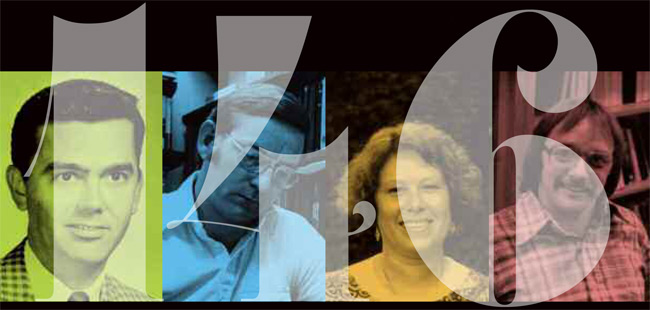
The careers of these four faculty members are not marked simply by years but by many successes. They have earned awards at Austin College and beyond for their professional work, won the admiration of their students, and gained the respect of their colleagues. The Student Affairs Division awards the E. Don Williams Outstanding Greek Sponsor Award each spring to commemorate his many years of support of students in the Greek system. This spring, the division’s annual award for faculty/staff support of the division was named the Howard A. Starr Faculty/Staff Co-Curricular Support Award to recognize Howard’s contributions to student life. These are just a few of the accolades that mark the careers of this spring’s retirees.
Whatever their futures may hold, the Austin College community sends these beloved professors forth with the highest respect and the brightest good wishes—and the hopes that however far abroad upcoming travels may take them, their paths will lead home to Austin College long into the future.
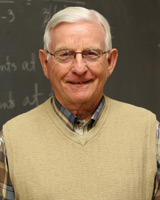 E. Don Williams
E. Don Williams
Professor of Mathematics
Chadwick Chair in Mathematics
Austin College Teaching Career 1970 – 2013
Austin College is a wonderful place and I will always be thankful for the opportunity to teach and work here. I first taught summer school here in 1965 and liked what I saw and experienced. I am glad I had the opportunity to return full time. While the campus and curriculum have changed over time, Austin College is still a place that cares for students and for everyone who works here.
Currently, I plan to teach one Austin College course each fall and spring and that will keep me involved with students and faculty and events on campus. I am particularly happy to have the opportunity to teach in the new IDEA Center.
Visiting new places with my wife, Ann, and work in the yard growing flowers also will occupy my time. Leisurely traveling the border of Texas is still a priority. Other than that, I will heed advice I was given about taking on too many commitments, and on some days, I may not wear a watch.
The College has been good to me and my family in other ways. Ann earned an endorsement to teach mathematics in the public schools; our children, Susan ’89 and Kenneth ’93, graduated from the College, as did Kenneth’s wife, Jasmine Soday ’95, and Susan and her husband, Sean Auerbach, were married in Wynne Chapel. We have many lasting friendships with current and former students, faculty, and staff.
Early in my career I was told employees were required to contribute to a retirement fund. My parents saved, so that was something I expected to do. While it was easy to ‘need’ the money for other purposes when our family was young, we now reap the benefits of having planned and saved for the future. Austin College contributed to that fund, and I am very grateful for that.
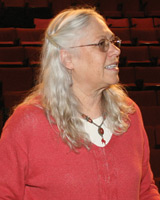 Kathleen Campbell
Kathleen Campbell
Professor of Theatre
Austin College Teaching Career: 1994 – 2013
I came to Austin College in fall 1994 and immediately found it to be a warm, friendly environment for my work. I found two great academic and artistic collaborators here—Dub Narramore and Andy Williams—and we did a lot of wonderful projects together. While I have missed them(since Dub’s retirement and Andy’s death), I’ve also had the opportunity to see the program change and grow with new faculty, Kirk Everist and Liz Banks, both of whom brought new and exciting skills to the College.
And I am always amazed by the ability of our students to step up and collaborate on an almost-professional level with theatre faculty and guest artists.
I’ve directed and designed a lot of productions since 1994, and it’s hard to single out favorites. I loved the costumes that I designed for Dub’s production of Macbeth and remember that as an especially wonderful collaboration. I remember well The Rover, my first production here, and the support I got from students who didn’t know me yet, and our production of Brian Friel’s Dancing at Lughnasa. And during the last few years, I’ve been able to direct several plays that were especially important to me: Three Sisters, Hamlet, Waiting for Godot, and Rosencrantz and Guildenstern Are Dead.
I’m also proud of bringing The Vagina Monologues to campus. We produced it seven times, each time raising significant funds for the local Crisis Center. It takes a lot of courage for the cast members to present this work, and it has been exciting to see these young women find their voices and speak out on the important issue of ending violence against women. Watching the growth of the participants is perhaps the most exciting part of doing these productions to me.
I cherish the freedom I have had at Austin College to develop new courses and explore new areas of interest. The quality of our students has challenged me to continually rethink what and how I teach. I have benefitted from the opportunity to work with faculty members from a broad range of disciplines.
Teaching in the Heritage program and working on curriculum changes in particular allowed me to get to know and appreciate the approaches and concerns of faculty across campus. I will move to Dallas this fall, where I hope to be involved in some theatre work, especially as a private voice and text coach. I am part of an intentional community that is building townhouses not far from White Rock Lake, and will spend part of my time working on the landscaping and tending flower beds on the new property. I hope to do more traveling. I’ll start by walking the West Highland Way (95 miles from Glasgow to Fort William) in Scotland with a Sierra Club group in September.
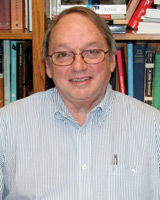 James F. Johnson
James F. Johnson
Professor of Classics
Austin College Teaching Career: 1977 – 2013
I have retired from Austin College after 36 years of teaching. I do it with mixed feelings since I enjoy teaching and working with students and colleagues, but, on the other hand, it will be good to have a schedule that I can set to do the things I want to do.
My wife, Scottie, finished her seminary studies at the same time. Our plan is to eventually move to San Marcos where our son, Joel, his wife Laura, and our only grandbaby, Alice Rosalie Johnson, reside. We especially want to be close to Alice so we can be around her as she grows and develops.
Scottie will be looking for preaching opportunities in the area, whereas I will focus first of all, on doing more reading and possibly, some writing in my fields of interest. I’ve collected quite a few books, but haven’t had the time to read them all. Now I’ll have time to do more of that—the scholarship/learning part of education. Also, I will continue my hobbies of playing bridge and playing some guitar now and then.
Regarding my career here at Austin College, I would say that I’ve been very fortunate to work in an institution that values education and to have many good students over the years who have been interested in learning what I have to teach.
My early career at Austin College had quite a few challenges, since I was asked to teach Heritage of Western Culture (HWC) as well as Communication/Inquiry (C/I). The HWC course required me to step out of my field (classics) at times but it was an enjoyable challenge, and I felt that the sequence provided the students with a good foundation for later learning. In the last few years, my focus has been on teaching “Classical Mythology,” a popular Humanities Division elective, as well as courses in ancient Greek and Latin. The Greek and Latin were subjects that I was trained to teach, and I have always enjoyed teaching them. Mythology was a challenge for me in the beginning, but over the years, it has become one of my favorite courses and one that students seem to enjoy quite a bit. Also, since 2008, I have led students on three January Term courses with travel to Greece (2008, 2010, and 2013) that were very rich, life-changing experiences for the students and for me as well.
In the future, I don’t know what more teaching I may do—it will depend on what opportunities become available; I might enjoy teaching one course per year or per semester. In the near future, our efforts will be spent largely in getting ready to move, selling our duplex, and finding a place to live in San Marcos. I also will have other projects here before we move, such as grading Advanced Placement Latin Tests in Salt Lake City in June and coordinating the Richardson Summer Language Institute here at Austin College in July. It’s an exciting time. Never a dull moment.
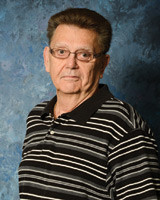 Howard A. Starr
Howard A. Starr
Professor of Psychology and Education
Austin College Teaching Career: 1964 – 2013
Can it really be that I’ve ended my career with Austin College after 48 years—plus having been with Richardson High School’s biology and counseling departments for five years? Get serious! 53 years!!
When I look back and ask “why education?” as a career, I immediately think of my first college psychology class under Sister Francis Marie of the Sisters of St. Mary of Numar at the University of Dallas. She modeled the empathy and dedication I’ve tried to imitate, not only in my classroom but also in the thousands of hours I’ve spent as a psychotherapist. To me, teaching is both an art and a science. I know of no other position where the slate is clean each September. Yet the challenges to harness the most from each of the new and returning students remain utmost. With a variety of other positions I’ve held here at the College—such as department chair, dean of Social Sciences, and vice president of the now-reconfigured College Relations Division—teaching has always been my passion. There’s nothing like being in the classroom.
I’ve taught “Death and Dying” every semester for more than 25 years; that’s been my favorite class. That came from my interest in the psychology of hospice. It was a new arena of study when I took it up and I spent a sabbatical studying hospice treatment and the psychology of bereavement. That class and others I have been able to develop have kept me getting out of bed every morning and coming to work.
But, it’s like a moment in time, not 48 years. I really did get to go every day to a place for which I have a great passion. What’s next? At 75 years of age that is a very good question. Number one on my agenda is a trip to Spain and a 16-day transatlantic cruise back to New Orleans. Then I will volunteer at Home Hospice of Grayson County; I was one of its founders 25 years ago. I also will volunteer at Texoma Medical Center. Another area of interest I’ve developed has to do with understanding the high level of frustration I see in large numbers of new faculty today compared to earlier in my career. Over the last year, I have been researching how frustration relates to thwarted power needs.
A word about students: they are always unique, challenging, bewildering, and, yes, frustrating. Yet beyond those descriptive terms, I will remember their needs to be understood, to have a role model for catharsis and empathy, and to have a person who would take time not just to hear them but to listen and mentor.
Will I forget these years? Never.
